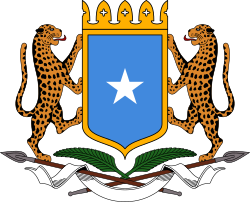History
In May 2013, the Somali federal government announced that it had launched a new Public Finance Management Policy (PFMP) in order to streamline the public sector's financial system and to strengthen the delivery capacity of the government's financial sector. Endorsed by the Somali Council of Ministers on May 2, [7] the reform plan has a robust fiduciary framework according to the African Development Bank (AfDB). [8] It is intended to serve as a benchmark for public financial management and the re-establishment of national institutions. The PFMP aims to provide transparent, accurate and timely public sector financial information by ameliorating the national budget process' openness, rendering more efficient and effective public spending, and improving fiscal discipline via both internal and external control. It also sets out to concentrate public expenditure on government priority areas. According to Cabinet members, the policy will cost an estimated $26 million and is expected to be fully implemented over the next four years. [7]
On 17 January 2014, newly appointed Prime Minister of Somalia, Abdiweli Sheikh Ahmed split the ministerial portfolio into Ministry of Finance and Ministry of Planning, respectively. [9]
In February 2014, Minister of Finance Hussein Abdi Halane announced the establishment of a new financial governance committee. The panel is part of an effort by the central authorities to build a more transparent financial system in order to attract additional foreign budget assistance. It will see Somali officials confer with World Bank, International Monetary Fund and African Development Bank representatives, with committee members tasked with providing advice on financial matters. [10] On 29 March 2014, during a parliamentary session, Speaker of the Federal Parliament Mohamed Osman Jawari also announced that all withdrawals from the Central Bank would as of 1 April 2014 require the written approval of the parliamentary finance committee. [11]
In November 2014, the Ministry of Finance launched a new automated Somalia Financial Management Information System (SFMIS) in place of its former manual system. The SFMIS will support reforms made through the Public Finance Management Policy. It aims to strengthen administrative transparency in terms of asset recovery, contracts, concessions and other transactions, and to ameliorate the accuracy, comprehensiveness and timeliness of monetary reports in order to facilitate decision-making. In particular, the system will be centered on registering budget, revenue and expense related data. Electronic financial reports are also slated to be made available through the ministry's official website. The SFMIS' robust IT infrastructure will be installed in all of the Ministry of Finance's offices, as well as in major governmental agencies and partner institutions. Its implementation is funded by the World Bank, and is scheduled to be fully operational in January 2015. [12]
In September 2015, the Ministry of Finance contracted Smart General Services, Ltd., to collect road taxes and vehicle registration fees on behalf of the Federal Government. Despite a standing Government directive that all State revenue be routed to the Treasury Single Account at the Central Bank of Somalia, the taxes and fees generated by Smart General Services were deposited into a private account at Salaam Somali Bank in Mogadishu. The net revenue, once the company had deducted its 40 per cent share, was intended to be transferred from Salaam Somali Bank to the Treasury Single Account every 15 days. The UN Somalia and Eritrea Monitoring Group found that, instead, only $62,648 (4.2 per cent) of the $1,481,695 generated by Smart General Services from August 2016 to May 2017 was ever transferred to the Treasury Single Account. Moreover, revenue was transferred inconsistently and with irregularities. [13] There were public accusations in August 2016 that "Fargetti", the Minister at the time, had embezzled large sums from the tax receipts. [14]
This page is based on this
Wikipedia article Text is available under the
CC BY-SA 4.0 license; additional terms may apply.
Images, videos and audio are available under their respective licenses.


